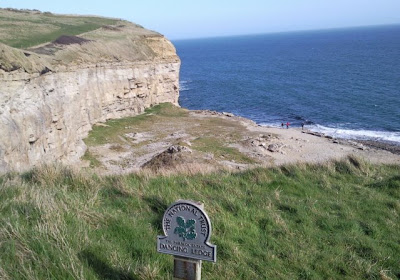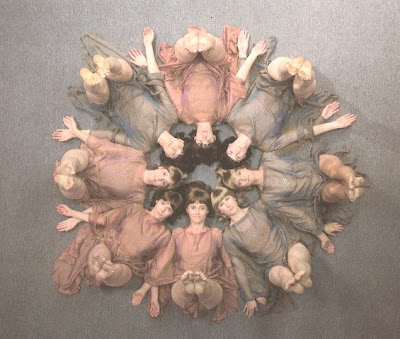Following my earlier post about the 25th anniversary of the Miners Strike, here's some recollections of being a strike supporter in Kent - plus next in a series on miners strike songs, Dick Gaughan's The Ballad of '84.When the Miners Strike started in 1984 I was living in Whitstable in Kent, very close to the small Kent coalfield. The Kent mining villages in the 1980s were radically distinct from the surrounding area. In the middle of the 'garden of England' the three pits of Snowdown, Tilmanstone and Betteshanger were more or less the only major industry, employing two thousand miners, many of them living in the villages of Aylesham, Elvington and Mill Hill on the edge of Deal. A fourth Kent pit, Chislett, had been closed in 1968.
Betteshanger in particular had a long history of militancy. During the Second World War, three union officials were imprisoned and over 1000 men were prosecuted after going on strike. In 1961 miners occupied the pit for 6 days in a stay-down strike in a successful protest against redundancies - 'an old record player was sent down the pit, and each of the teams organised a show of songs and comedy acts' (Pitt). In the 1972 strike, Kent miners had travelled around the country as 'flying pickets' .

Map of the Kent coalfield (from Pitt)
My first introduction to the mines was during my pre-strike time in the Socialist Workers Party when the worst task for a drinking and smoking student was a paper sale at the pit gates early in the morning as the miners were changing shifts. We never seemed to sell more than 1 or 2 - there were a few vaguely sympathetic miners, but nobody wanted to talk politics a couple of hours the wrong side of dawn. Most just walked by no doubt wondering quite rightly why anyone would want to get out of bed that early unless they had to. Soon I too was crying off the early shift, and indeed the whole trotskyist project, but that's another story.
When the strike started, me and some friends at our college (University of Kent at Canterbury) took the initiative to set up a Miners Support Group. The aim was practical solidarity - we collected money, organised transport to demonstrations and pickets and generally encouraged support for the strike. There was plenty of support to be tapped into, even though for most people this never went beyond putting some money in a bucket and wearing a 'coal not dole' sticker. As the radical historian Raphael Samuel perceptively argued at the end of the strike: 'In retrospective it can be seen that support for the strike, though fervently expressed, was also precarious; that it was predicated on the miners' weakness rather than their strength; and that it owed more to a humanitarian spirit of Good Works, than, in any classical trade union sense, solidarity, and it is perhaps indicative of this that the local organisation of aid took the form of Miners Support Groups rather than, as in 1926 - an analogy fruitlessly invoked - Councils of Action. The support was heartfelt and generous, but with the important exception of the seamen, the railwaymen and the Fleet Street printers, it did not involve stoppages of work'.
 Coal Not Dole - slogan in Whitstable, Kent (by the Labour Club)
Coal Not Dole - slogan in Whitstable, Kent (by the Labour Club)
The strike polarised society with passionate support on the one hand and equally virulent opposition on the other. We encountered some of the latter in Kent too, from the college official who tried to stop us collecting to our landlord in Whitstable who tried to get us to take down posters from our window.


Kent NUM leaflet from May 1984 [click on pictures to enlarge] - 'Our fight is a fight for everyone' - the language of this leaflet is very much in line with the Communist Party of Great Britain politics of Kent NUM leaders Jack Collins and Malcolm Pitt, combining calls for solidarity with appeals to nationalist sentiment (e.g. 'The Coal Mining Industry of Britain belongs the whole nation')
When the strike started, the Kent miners unanimously joined in. In Nottinghamshire many miners continued to work, and strikers from Kent travelled up to the Midlands to join their comrades from Yorkshire in picketing the working mines. The police mounted a massive operation to prevent the Kent miners from moving around the country. 'On Sunday March 18th, police officers from the Kent constabulary attempted to stop anyone who appeared to be a miner or who was going north to aid the miners strike from crossing the Thames through the Dartford Tunnel'. Strikers were threatened with arrest for trying to leave Kent, even though the police had no legal powers to stop them (State of Siege).
Malcolm Pitt , President of Kent National Union of Mineworkers, was jailed for 18 days for defying bail conditions which prohibited from going anywhere near a picket line. I took part in pickets of Canterbury Prison, where he was being held in May 1984.
Later in the strike, some Kent miners did begin to go back to work and the strikers mounted pickets of the Kent pits. The Miners Support Group joined the pickets, and the canteen in the miners welfare club had to get used to the vegetarian demands of student radicals!
The Kent miners were the last return to work in March 1985, staying out longer than the rest of the country in an attempt to win the reinstatement of miners sacked during the strike. Within five years all three of the remaining Kent mines had been closed for good, with the loss of 2000 jobs (Betteshanger was the last to go in 1989)
References: Malcolm Pitt, The World on Our Back: the Kent Miners and the 1972 Strike (London: Lawrence and Wishart, 1979); ; Raphael Samuel, Barbara Bloomfield and Guy Boanas (eds.), The Enemy Within:Pit villages and the Miners Strike of 1984-5 (London: Routledge, 1986); Jim Coulter, Susan Miller and Martin Walker, State of Siege: Miners Strike 1984- Politics and Policing in the Coal Fields (London: Canary Press, 1984). There's some interesting material on the strike in Kent here
Dick Gaughan
The folksinger Dick Gaughan was a tireless supporter of the Miners Strike, performing at benefit gigs all over the UK. Immediately after the strike he wrote a song about it entitled The Ballad of 84, first performed at a benefit for sacked miners at Woodburn Miners Welfare Club in Dalkeith, Midlothian in '85.
Gaughan's song recalls the strikers who died, as well mentioning Malcolm Pitt and others who were imprisoned:
Let's pause here to remember the men who gave their lives / Joe Green and David Jones were killed in fighting for their rights / But their courage and their sacrifice we never will forget / And we won't forget the reason, too, they met an early death / For the strikebreakers in uniforms were many thousand strong / And any picket who was in the way was battered to the ground / With police vans driving into them and truncheons on the head/ It's just a bloody miracle that hundreds more aren't dead... And Malcolm Pitt and Davy Hamilton and the rest of them as well / Who were torn from home and family and locked in prison cells'.
You can listen to the song here.
I will be doing some more posts about the miners strike, if you can recommend any songs (or better still point me in the direction of MP3s) let me know. Particularly keen to get hold of Chumbawamba's Common Ground and Fitzwilliam - my tapes long lost - and The Enemy Within track (done by Adrian Sherwood).

 Punk band The Ruts were also involved in the People Unite collective and released Jah War, a song about the events on the People Unite record label. The lyrics include the lines: 'Hot heads came in uniform, Thunder and lightning in a violent form... Clarence Baker, No trouble maker, Said the truncheon came down, Knocked him to the ground, Said the blood on the streets that day'.
Punk band The Ruts were also involved in the People Unite collective and released Jah War, a song about the events on the People Unite record label. The lyrics include the lines: 'Hot heads came in uniform, Thunder and lightning in a violent form... Clarence Baker, No trouble maker, Said the truncheon came down, Knocked him to the ground, Said the blood on the streets that day'.







 In 1913, aged 16, she moved to San Francisco where she became an actress. She had a starring role in a Hollywood silent movie, The Tiger's Coat (1920), playing a Mexican servant who ended up heading a dance troupe.
In 1913, aged 16, she moved to San Francisco where she became an actress. She had a starring role in a Hollywood silent movie, The Tiger's Coat (1920), playing a Mexican servant who ended up heading a dance troupe.








